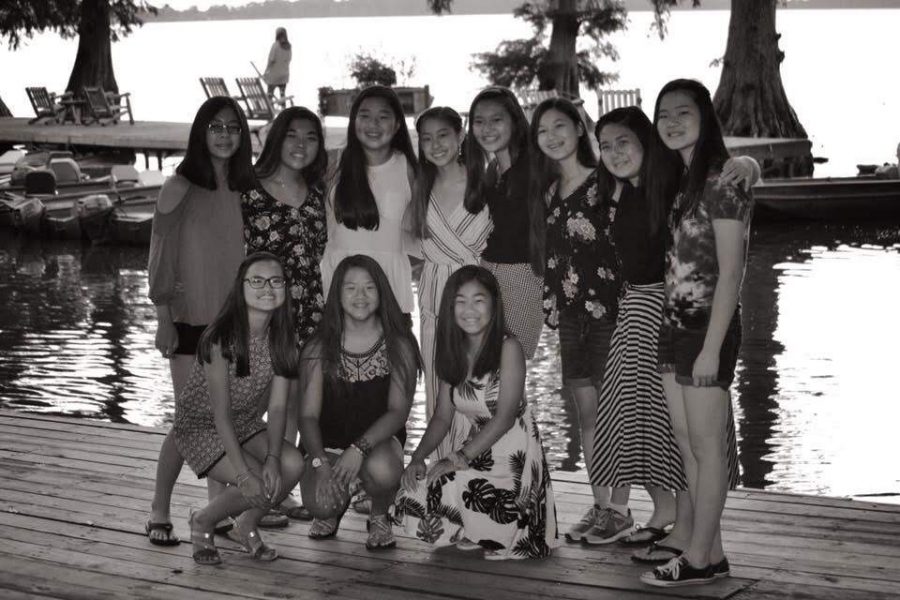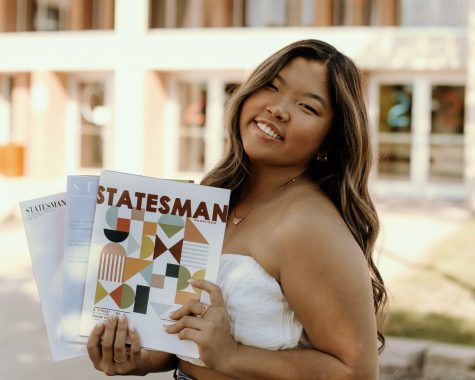Being Asian in America
A picture of Sandvall and her adoption group in Tennessee from 2018.
March 25, 2021
From a young age, I was always taught the value of respecting others and their differences. I was adopted from an orphanage in Changsha, China when I was nine-months-old. Although I do not remember much from my short-lived childhood in China, it is still a vital part of who I am and who I wish to become. I remember so vividly going to pre-kindergarten on my golden birthday. I had on my Cheongsam, a traditional Chinese dress that my mom had specially bought me in Chinatown that past summer to wear only on my golden birthday. It was snack time and I was passing out my cupcakes I had brought until one of my male classmates said directly to me, “Why are you wearing your pajamas, it is literally your birthday.” He meant no harm with his words, but for the first time, I felt different because of my race. This experience was the first of many.
Fast forward 11 years and now I am in high school, the “best four years of your life,” right? Well, whoever told me that was lying because so far it has been the worst two years of my life. Growing up is scary but growing up alongside people who believe that race is a factor in friendship is another level of frightening. I have seen some of my childhood best friends remain friends with me solely because I am the one who “adds diversity to the group.” I have known for my whole life I was never going to be physically like other kids, but I never expected that it would have such an immense effect on the way people perceived me. In the past year, this effect has become even more prominent.
When rumors first arose about the origin of COVID-19 being a Chinese man eating a bat, Americans put all the blame on Asians. In Asian culture, people hunt 64 different types of bats and use their meat for medicinal use and traditional cooking. That did not stop my peers from cracking jokes such as “you brought COVID-19 to America” or “What if it was your biological dad who ate the bat?” Additionally, the idea of the “China virus,” as COVID-19 was referred to by ex-president Trump, did not help our case. Many Asians noted that this phrase alone caused hate to arise much quicker than expected.
According to NBC News, anti-Asian hate crimes have increased by nearly 150% in 2020 in the United States. In cities such as New York, Los Angeles and Seattle, the incidents have increased from 49 to 122 in only one year. On March 21 alone, eight Asian spa workers were killed in a mass shooting in Atlanta, Georgia. A 66-year-old Asian man was punched in the face for peacefully protesting in New York’s Chinatown. A 37-year-old Asian male in England was yelled racial slurs such as “China virus” and eventually got attacked. These three incidents are just a few of the many examples of the rise of anti-Asian hate crimes in the past few months. The dramatic increase in these occurrences has shed a light on the rapidly changing lives of Asians across the globe.
Our culture has normalized the stereotypes that Asians are either owners of a nail salon or wealthy businessmen/women, and these stereotypes against Asian-Americans are nothing new. People of Asian descent have been subject to racism in the U.S. for centuries. In the late 1800s and early 1900s, people of Asian descent were driven out of over 200 countries because they were labeled as “economic competitors.” As the Asian population has exponentially grown, so has the racism toward them.
Race has become such a large factor in today’s society that it is hard to escape it; especially when people are so dependent on two things: physical appearance and intelligence. While growing up, I was always assumed to be a smart kid; I was advanced in reading and writing and I could solve math problems in two seconds. It was assumed that effort was not necessary for my success. But the truth is, I am still a human; I will never be perfect. The expectation of being the “smart one” simply based on my appearance was and still remains to be, exhausting.
When looking forward to my future, college is something I think about every day. I work to keep good grades, get good test scores and load on extracurricular just to be set back. When universities look at applicants, there are much higher expectations for Asians. In 2014, Harvard University was accused of “pitting” or belittling of Asian Americans; however, it was not only Harvard. This lawsuit brought to light how many schools are taking race into account every single year. Although I am only a sophomore, the thought of being an Asian woman applying to college in only two short years terrifies me.
The Asian hate crimes on the news are not a trend, they are a call for people to open their eyes to an issue that has been swept under the rug for years. As a woman growing up in the Midwest, it is harder to empathize with those around you. Protests and petitions are a great way to spread awareness; however, it only does so much. As humans, it is our job to respect others even if Asian culture is not as prominent.
Similar to American culture, Asian culture has its own traditions that have important values. For example, in Japan, they celebrate Children’s Day, a day where they celebrate the happiness of children. Also, they celebrate Lunar New Year, a day where they celebrate the beginning of a new year according to a lunar calendar. South Dakota does not offer many opportunities to celebrate these traditions, nevertheless, many states host huge festivals (sometimes more than just one day) to honor the Asian culture and the value. Asian culture should not be stereotyped as egg rolls and k-pop because there are so many diverse opportunities that one gets to experience.
This story was not to advise you to pity Asians or care about us more, but to bring awareness to the daily fear we face when going out into society, especially after the pandemic. Although we can dream of an overnight solution for racism and hate crimes, it is not that simple. Be kind to one another, respect each other and do not exclude just because of race.









